Best Onboarding Software
Top Tools Compared for 2026
Buyer's Overview
SaaS companies today fight tooth and nail to acquire customers. Yet, after investing heavily in sales and marketing, many watch their hard-won customers slip away due to poor onboarding experiences. The first few weeks of a customer's journey can make or break their long-term success with your product - and ultimately, your relationship with them.
The stakes have never been higher. According to Wyzowl's 2024 research, 86% of customers say they're more likely to stay loyal to a business that invests in onboarding content, while 88% of customers say their decision to remain with a company long-term depends on the quality of onboarding. This reality has pushed organizations to fundamentally rethink their approach to onboarding.
"Organizations increasingly recognize customer onboarding as a function in itself: 60% of teams either have an independent and well-defined customer onboarding function or are in the process of setting up one."
- State of Customer Onboarding 2024, Rocketlane.
Similarly, for employee onboarding, disengaged employees in the US cost their employers $450 to $500 billion each year, making it hard to ignore the impact of a considered and engaging onboarding approach.
This shift from treating onboarding as an afterthought - both for customers and for employees - to viewing it as a critical business function has driven rapid evolution in onboarding tools and approaches.
Understanding Different Types of Onboarding Solutions
1. Customer Onboarding Software
Creating engaging customer onboarding experiences has become critical for SaaS businesses. Whether you're helping users understand your product features, guiding them through complex workflows, or managing enterprise implementations, the right onboarding approach can dramatically impact adoption rates and customer satisfaction.
In-App Guidance Platforms
Interactive product tours and walkthroughs
Contextual help and tooltips
Feature announcements and user analytics
Best for: Progressive feature discovery and activation
Video Onboarding Solutions
Product demonstrations and tutorials
Feature walkthroughs
Best practices guides
Best for: Visual learners and complex workflows
Onboarding Project Management
Customer journey orchestration
Milestone tracking
Resource management
Best for: High-touch onboarding with multiple stakeholders
Quick Comparison: Customer Onboarding Software Types
Type | Best For | Key Tools |
|---|---|---|
In-App Guidance | Product adoption | Pendo, UserPilot, AppCues |
Video Tutorials | Visual learning | Clueso, Camtasia, Loom |
Project Management | Enterprise clients | Rocketlane, Dock, GuideCX |
Employee Onboarding Software
Employee onboarding presents unique challenges compared to customer onboarding - organizations need to efficiently transfer knowledge about company culture, internal processes, and various tools while maintaining consistent quality across different departments. According to Gallup, only 12% of employees strongly agree their organization does a great job of onboarding, highlighting the need for better solutions. Employee onboarding tools address different aspects of bringing new team members up to speed:
Company Culture & Practices
AI-powered video presentations
Training material creation
Virtual meeting platforms
Best for: Company-wide policies and cultural alignment
Technical Onboarding
Step-by-step guides for internal tools
Process documentation
System walkthroughs
Best for: Software and workflow training
Quick Comparison: Employee Onboarding Software Types
Type | Best For | Key Tools |
Company Practices | Cultural training | Clueso, Synthesia, Zoom, Teams |
Technical Training | Tool adoption | Clueso, Whatfix, Tango |
Top Customer Onboarding Software Tools Compared
Here’s a side-by-side comparison of the top onboarding solutions to help you choose the best customer onboarding software for your needs -
1. Video-Based Onboarding Solutions
While in-app guidance helps with feature discovery, video tutorials remain the most effective way to demonstrate complex workflows and ensure users truly understand your product. However, teams often struggle between choosing quick, simple recordings that lack professionalism, or sophisticated editing tools that require significant time and expertise.
Video-Based Customer Onboarding Solutions: Quick Overview
Feature | Clueso | Camtasia | Loom |
|---|---|---|---|
Professional Voiceovers | ✓ | Manual | ❌ |
Documentation Generation | ✓ | ❌ | ❌ |
Content Updates | ✓ | Manual re-recording | Manual re-recording |
Multi-language Support | ✓ | Manual | ❌ |
Learning Curve | Low | High | Low |
Enterprise Security | SOC2, ISO 27001 | SOC2, ISO 27001 | Basic SSO |
Creation Time | ✓ Minutes | Hours | ✓ Minutes |
Clueso
Clueso represents the next evolution in onboarding content creation, combining powerful AI capabilities with professional features that transform simple recordings into polished, branded content. It automates the entire workflow - from script enhancement to professional voiceovers and instant documentation. What takes hours in other customer onboarding software solutions takes minutes in Clueso, making it ideal for teams who need to create and maintain professional onboarding content at scale.

Key Features
AI-powered script generation
Studio-quality AI voiceovers in 40+ languages
Automatic article generation with screenshots and GIFs
Multi-language support with AI translations
One-click branding and customization
Easy content updates without re-recording
Enterprise-grade security features
What Users Love
"Clueso has been a game changer in creating our user education content. We’re now generating high-quality user guides 10x faster.”
- Angelo Huang, Co-founder and CEO, Swif
➡️ Read more about how Swif transformed their customer education with Clueso here
Camtasia
A robust video editor that offers extensive customization for creating detailed product tutorials with professional transitions and effects.

Source: TechSmith
Features:
Full video editing suite
Extensive effects library
Multiple audio tracks
Custom transitions
Pros:
Powerful editing capabilities
Large resource library
Extensive customization options
Strong community support </aside>
Cons:
Steep learning curve
Time-intensive editing process
Manual voiceover recording required
Expensive one-time purchase
Loom
Where Clueso and Camtasia focus on creating polished onboarding content, Loom emphasizes quick, informal video communication. Originally designed for internal team messaging, Loom has evolved to include basic features for customer-facing content. Its strength lies in speed and simplicity - perfect for quick updates or simple explanations. However, this simplicity comes at the cost of professional features - teams often find themselves needing additional user onboarding solutions to create the kind of polished, branded content modern customers expect.
A quick and simple solution for basic screen recording for simple product demos with easy sharing capabilities.

Source: Loom
Features:
Quick recording via browser extension
Basic editing capabilities
Cloud storage
Viewer insights
Pros:
Easy to use
Quick sharing options
Good for team communication
Reliable cloud storage
Cons:
Limited professional features
Basic editing capabilities
No advanced effects
2. In-App Guidance Platforms
While video tutorials excel at demonstrating complex workflows, in-app guidance helps users discover features in context. These tools serve different but complementary purposes in your onboarding strategy. They typically appear as a series of tooltips or modals that highlight specific UI elements.
In-App Guidance Platforms: Quick Overview
Feature | Pendo | UserPilot | AppCues |
|---|---|---|---|
Event-based guide triggering | ✓ | ✓ | Enterprise only |
Mobile Support | Limited | Limited | x |
Native analytics | ✓ | ✓ | x |
Knowledge base linking | x | ✓ | Enterpise only |
A/B Testing | Advanced | Basic | Basic |
Pendo
Pendo approaches onboarding from a data-first perspective, combining analytics with in-app guidance. Unlike content creation tools like Clueso that focus on comprehensive product education, Pendo specializes in understanding user behavior and creating targeted tooltips. While powerful for feature discovery, teams often find themselves needing additional onboarding software solutions for creating actual training content and documentation.

Source: Pendo
Features:
Interactive walkthroughs
User analytics
Feature adoption tracking
Custom messaging
A/B testing
Usage patterns
Pros:
Deep analytics capabilities
Good for data-driven decisions
Strong enterprise features
Multiple app support
Cons:
No content creation capabilities
Significant setup time
Steep learning curve
UserPilot
UserPilot positions itself as a simpler alternative to Pendo, focusing on quick implementation of product tours and feature announcements. While this user onboarding software makes creating custom in-app guidance easy, and provides detailed analytics for product usage, it doesn’t support the actual creation of onboarding guides and videos.
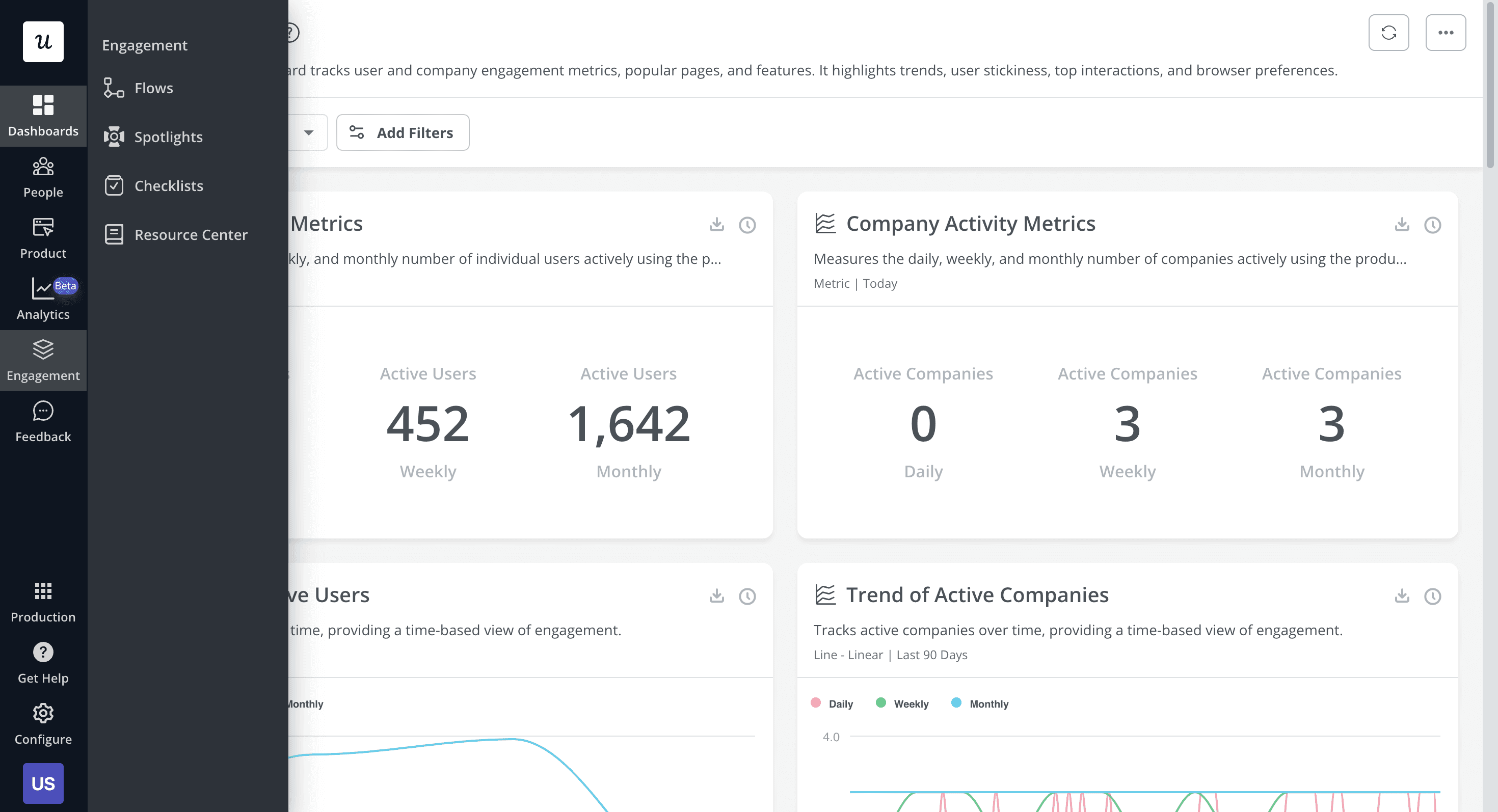
Source: UserPilot
Features:
Code-free UI analytics
User segmentation
Resource center
Simple implementation
Pros:
Robust behavior tracking & analytics
Easy to implement
Good for gathering user feedback
Cons:
No content creation capabilities
AppCues
AppCues strikes a middle ground between Pendo's complexity and UserPilot's simplicity in the in-app guidance space. However, like other saas onboarding tools in this category, it focuses solely on in-product experiences, requiring teams to use separate solutions for creating tutorial content and maintaining documentation.

Source: AppCues
Features:
No-code builder
UI element tooltips & feature discovery
Flow analytics
Goal tracking
Theme customization
Pros:
Ideal for basic UI introduction and simple feature highlights
Good for first-time user guidance
Simple implementation
Cons:
No content creation capabilities
Cannot effectively demonstrate complex workflows or processes
Can get expensive at scale
3. Onboarding Project Management
This type of onboarding software for saas focuses on orchestrating the human side of onboarding, particularly valuable for companies with complex implementation processes requiring significant customer interaction.
Project Management Platforms: Quick Overview
Feature | Rocketlane | Dock | GuideCX |
|---|---|---|---|
Client Portal | ✓ | ✓ | ✓ |
Project Templates | ✓ | ✓ | ✓ |
Content hosting | ✓ | ✓ | ✓ |
Content creation | x | x | x |
Rocketlane
Purpose-built for managing high-touch customer onboarding, Rocketlane excels at coordinating complex implementation projects. While tools like Clueso handle the content creation aspect of onboarding, Rocketlane manages the project management and client communication aspects. This makes it complementary rather than competitive with content creation platforms.
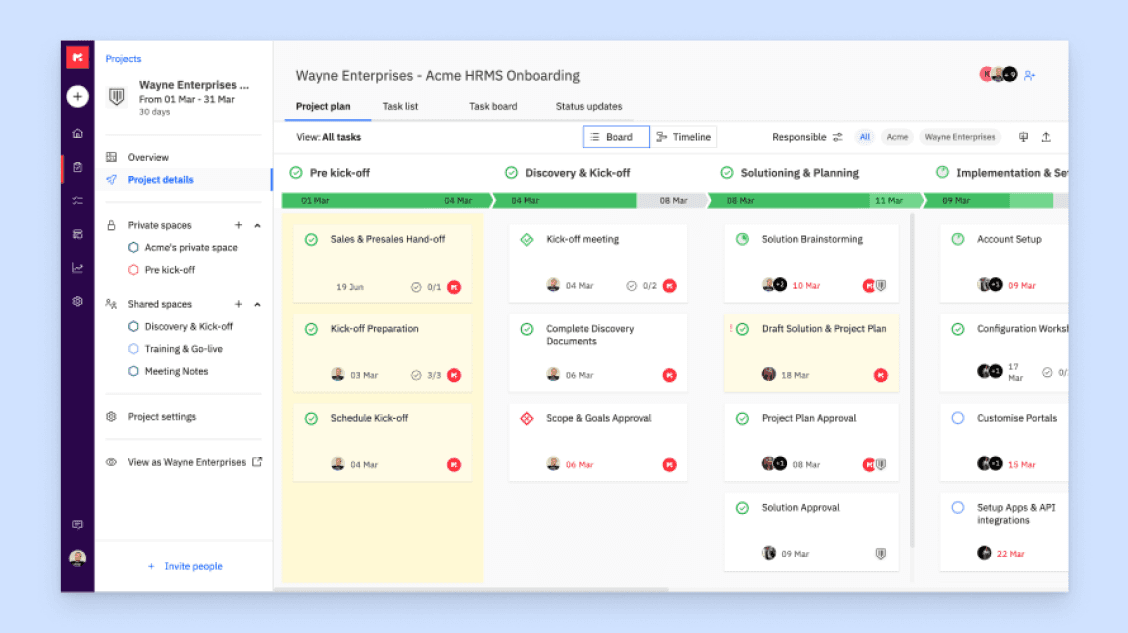
Source: Rocketlane
Features:
Customer portal
Project templates
Time tracking
Document collaboration
Milestone tracking
Integration capabilities
Pros:
Purpose-built for onboarding management
Strong client collaboration
Good project visibility tools
Cons:
Requires separate content creation workflows
Complex setup process
Higher learning curve
Dock
While Rocketlane focuses on project management, Dock approaches onboarding from a client portal perspective. Think of this saas customer onboarding software as a resource hub for all resources and communications shared with a client - right from the deal stage to onboarding to renewals. That said, this user onboarding software requires teams to create and maintain all the actual onboarding content using other tools. This makes it a good complement to content creation platforms like Clueso rather than a standalone onboarding solution.
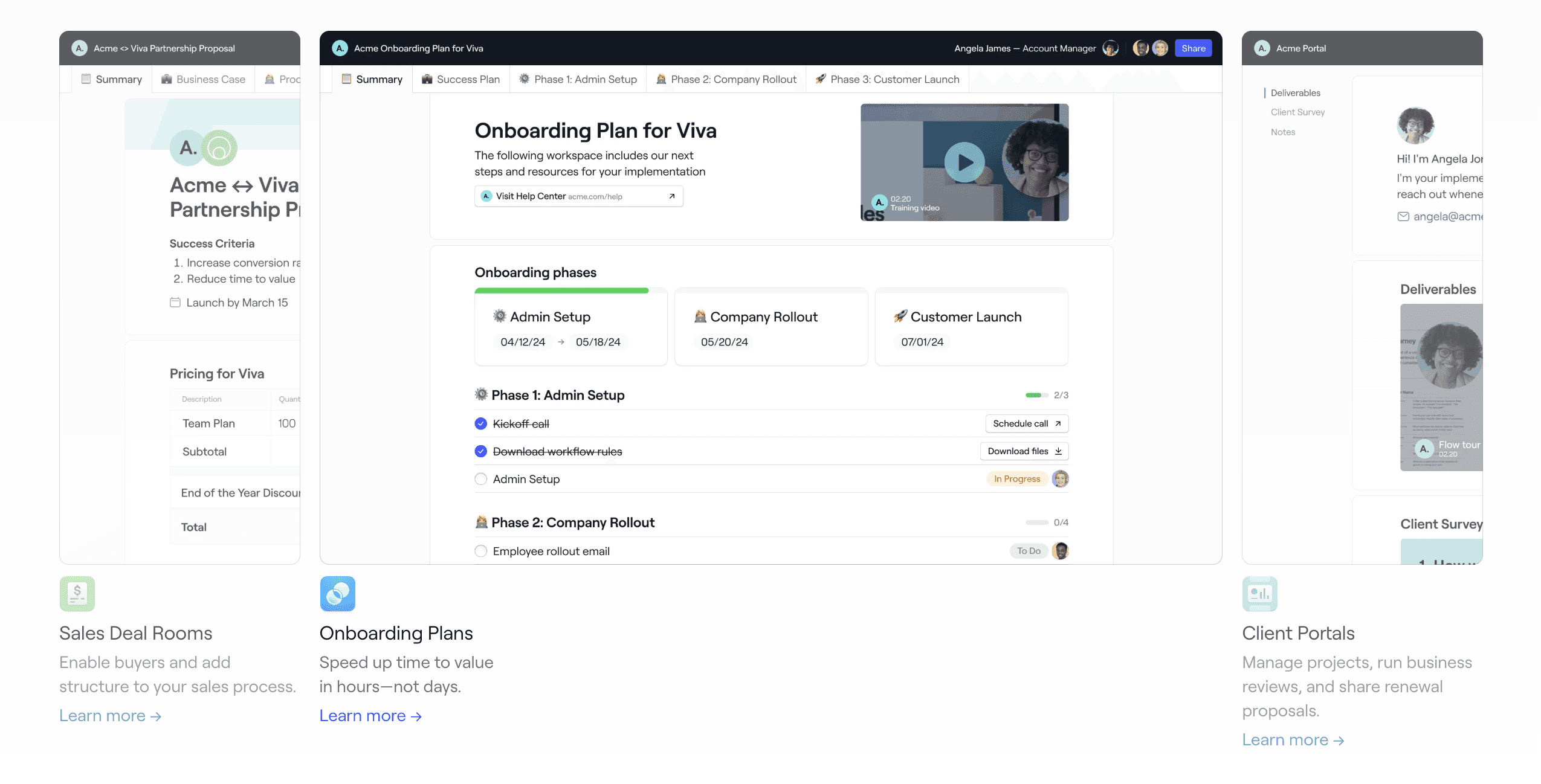
Features:
Sales deal rooms & client spaces
Project tracking and visibility
Document sharing
Meeting scheduling
Custom branding
Pros:
Clean client interface
Ready-to-use templates
Easy to customize
Cons:
Requires separate content creation workflows
Not mobile-friendly
GuideCX
GuideCX combines elements of project management and client portals but focuses specifically on implementation tracking. Like other product onboarding tools in this category, it handles the coordination aspects of onboarding well but requires separate solutions for creating the actual training content and documentation that drives successful implementations.
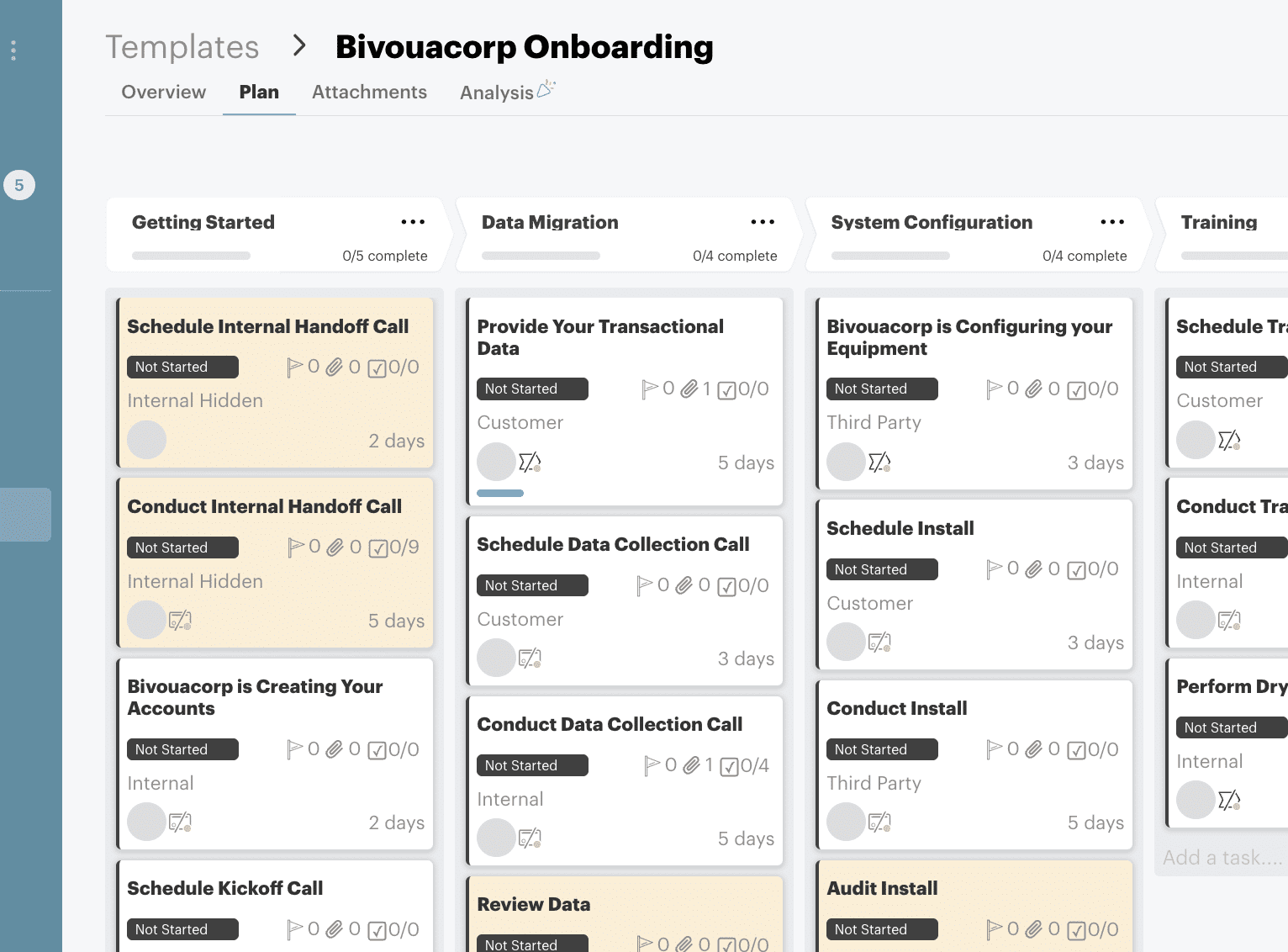
Source: GuideCX
Features:
Implementation tracking
Task automation
Client communication
Resource sharing
Progress reporting
Team collaboration
Pros:
Good for task management
Strong progress tracking
Client transparency
Automation options
Cons:
No content creation capabilities
Limited customization
Steep learning curve
Top Employee Onboarding Tools Compared
Company Practices & Cultural Training
Cultural Training Tools: Quick Overview
Feature | Clueso | Synthesia | Teams | Zoom |
|---|---|---|---|---|
Professional Videos | AI-enhanced | ✓ AI avatars | Basic recording | Basic recording |
Process Documentation | ✓ | ✗ | x | x |
Content Updates | Easy updates | Manual | Manual | Manual |
Multi-language | ✓ | ✓ | x | x |
Content Reusability | High | Medium | Limited | Limited |
Enterprise Security | SOC2, ISO | SOC2, ISO | SOC2, ISO | SOC2, IAPP, GDPR ++ |
Clueso
As an enterprise onboarding software for employee onboarding, Clueso shines in its ability to create consistent, professional training content that scales across the organization. Its unique combination of AI-powered video creation and automatic article creation makes it particularly valuable for teams that need to maintain large libraries of training content that requires frequent updates. Additionally, teams that have previously used slides to share onboarding materials can now convert these decks into slick videos with professional narration to create more engaging experiences.
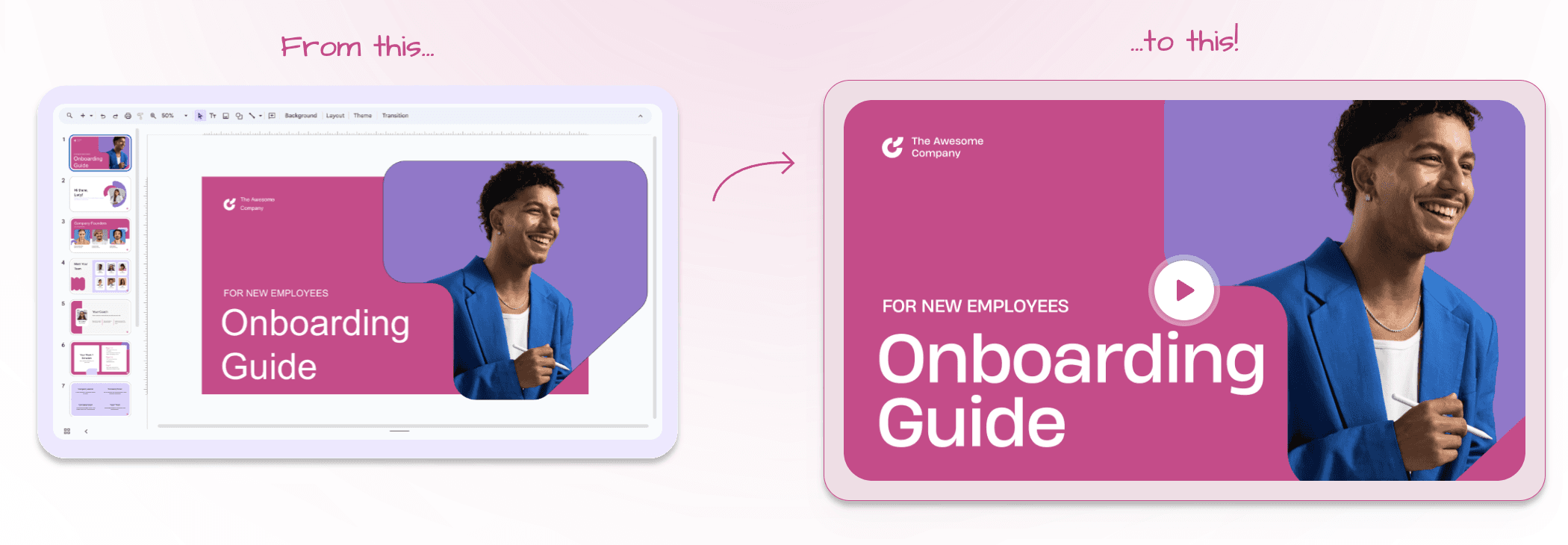
Features:
Professional videos and step-by-step documentation from a single recording
PPT/Slides to video conversion with professional voiceovers
Localization with translations and dynamic captions in 20+ languages
Easy to update when features change
Automated transcript generation
What Users Love:
"We used to spend hours writing articles and creating video guides. Now, with a few clicks, we have professional video guides with no background noise, that are easily edited if we want to change anything."
Nadia Jenayah, Product Adoption Specialist, Efficy
Synthesia
Synthesia takes a different approach to training content, focusing on creating presenter-led videos with AI avatars. While effective for certain types of corporate communications, it lacks the ability to show actual software interfaces or document real workflows, making it more suitable for high-level messaging than practical training.

Source: Synthesia
Features:
AI avatar creation
Script-to-video conversion
Multi-language support
Template library
Studio backgrounds
Pros
Good for corporate communications
Multiple language options
Professional presenter look
Cons
Limited to talking head videos
Requires pre-made scripts
Cannot show actual product workflows
No documentation generation
Teams/Zoom
These communication platforms serve as the backbone for live virtual training sessions. While essential for real-time interaction and immediate feedback, they don't provide solutions for creating reusable training content or documentation, often requiring integration with other content creations tools like Clueso to create lasting training resources from live sessions.

Source: Microsoft Teams

Source: Zoom
Features:
Live virtual training and session recordings
Breakout rooms
Chat features
Calendar integration
Pros:
Real-time interaction
Good for group training
Cloud-based recording
Cons:
Basic recording features
Limited post-production
No documentation capabilities
Updates require re-recording
Technical Training Solutions
Technical Training Tools: Quick Overview
Feature | Clueso | Whatfix | Tango |
|---|---|---|---|
Interactive Guides | ✓ Video + Docs | ✓ In-app | Static only |
Video Creation | ✓ Professional | ✗ | ✗ |
Process Documentation | ✓ Enhanced | Limited | ✓ Basic |
Content Updates | ✓ One-click | Complex | Manual |
Implementation | ✓ Quick | Complex | ✓ Easy |
Analytics | ✓ Full | ✓ Advanced | Basic |
Enterprise Features | ✓ Comprehensive | ✓ Complex | Limited |
Whatfix
Specializing in digital adoption, Whatfix creates interactive guides directly within applications. While effective for real-time software guidance, this platform for employee onboarding saas focuses solely on in-app experiences and lacks the ability to create comprehensive training content or documentation that users can reference outside the application.

Source: Whatfix
Features:
Interactive in-app guidance
User analytics
Pins and nudges
SCORM compliance
LMS integration
Pros:
Good for software adoption
Real-time guidance
Analytics tracking
Enterprise integration
Cons:
Complex implementation
Limited to in-app guides
No video creation
Expensive for large deployments
Requires technical setup
2. Tango
Tango automates the capture of step-by-step processes, making them useful for quick documentation of simple workflows. However, the output is limited to static guides, lacking the engagement of video content or the professional polish needed for formal training materials.

Source: Tango
Features:
Automatic step capture
Screenshot automation
Basic formatting
PDF export
Easy sharing
Pros:
Easy process capture
Good for simple guides
Low learning curve
Cons:
Static content only
Limited customization
Chrome extension-only
No video capabilities
No professional features </aside>
Best Practices for Creating Effective Onboarding
Content Strategy
Map Your Onboarding Journey
Define clear paths for different user segments
Create content hierarchy based on user needs
Plan update frequency and maintenance
Consider multi-channel distribution
Set clear success metrics
Production Standards
Establish branded templates
Define quality benchmarks
Create review processes
Set up content governance
Maintain consistent voice and tone
Content Management
Regular content audits
Version control system
Update triggers defined
Archive strategy
Content reuse plan
ROI Measurement
Track these metrics to measure the impact of your onboarding:
Customer Onboarding Metrics
Short-term Impact | Long-term Impact |
|---|---|
Time to first value | Customer retention |
Feature adoption rates | Product adoption |
Support ticket volume | Customer satisfaction |
User engagement | Expansion revenue |
Completion rates | Net revenue retention |
Employee Onboarding Metrics
Short-term Impact | Long-term Impact |
|---|---|
Time to productivity | Employee retention |
Training completion rates | Team productivity |
Knowledge retention | Cross-team collaboration |
Tool adoption rates | Employee satisfaction |
Feedback scores | Internal mobility |
Frequently Asked Questions About Onboarding Software
General Questions
What's the difference between customer and employee onboarding software?
While there's some overlap in features, customer onboarding software typically focuses on product adoption and self-service learning, while employee onboarding software emphasizes internal processes and compliance. However, modern tools like Clueso serve both use cases effectively by providing flexible content creation capabilities.
Do I need different tools for different types of onboarding?
Not necessarily. While some organizations use specialized tools for specific needs, modern platforms often combine multiple capabilities. For example, you can use Clueso for both video tutorials and documentation, while complementing it with in-app guidance tools for specific feature discovery needs.
How long does it take to implement an onboarding solution?
Implementation time varies by solution type:
Content creation tools (like Clueso): 1-2 days
In-app guidance platforms: 2-3 weeks
Project management tools: 1-2 weeks
Enterprise solutions: 4-8 weeks
Cost & ROI
How much should I budget for onboarding software?
Pricing varies by solution type:
Basic tools: $8-15/user/month
Professional solutions: $50-250/month
Enterprise platforms: Custom pricing Consider features, time savings, and team size when evaluating costs.
How do I measure the ROI of onboarding software?
Track metrics such as:
Reduction in training time
Decrease in support tickets
Improvement in feature adoption
Time saved in content creation
Customer/employee satisfaction scores
Technical Questions
What are the minimum technical requirements?
Most modern tools require:
Updated browser (Chrome recommended)
Stable internet connection
8GB RAM minimum Specific requirements vary by platform.
Can I update content when products or processes change?
Yes, but capabilities vary:
AI-powered platforms like Clueso: Easy updates without re-recording
Traditional tools: Usually require complete re-recording
Basic tools: Need new recordings for changes
Content Creation
How do I maintain consistent quality across teams?
Look for tools that offer:
Branded templates
Style guides
Team collaboration features
Review workflows
Automated quality controls
What's the best format for onboarding content?
Consider a mix of formats:
Video tutorials for complex processes
Interactive guides for feature discovery
Written documentation for reference
Live sessions for personal touch Choose tools that support multi-format content creation and management.
Enterprise Considerations
What security features should I look for?
Key security features include:
SOC 2 compliance
SSO integration
Role-based access
Content permissions
Secure hosting
Audit logs
Can I create onboarding content in multiple languages?
Yes, but capabilities vary:
AI-powered tools like Clueso: Often offer automatic translation and localized voiceovers
Traditional tools: Require manual translation and recording


